Iran's President, Saudi Crown Prince Discuss Mideast War
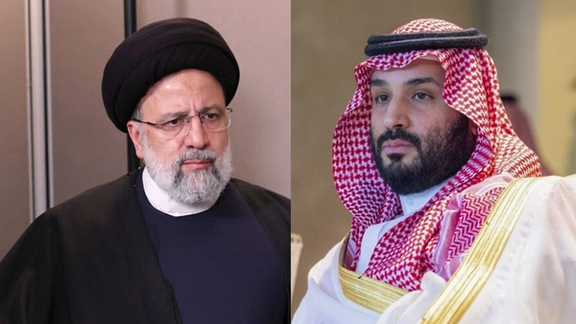
Iranian and Saudi government media reported a phone conversation between President Ebrahim Raisi and Crown Prince Mohammed bin Salman on the armed conflict between Israel and Hamas.

Iranian and Saudi government media reported a phone conversation between President Ebrahim Raisi and Crown Prince Mohammed bin Salman on the armed conflict between Israel and Hamas.
The Saudi official news agency said that bin Salam received a call from the Iranian President on Wednesday, and they discussed “the ongoing military escalation in Gaza.” The Crown Prince emphasized Saudi Arabia’s efforts to halt the military escalation and protect innocent lives.
According to the Saudi news agency bin Salam “asserted the Kingdom's opposition to any form of civilian targeting and the loss of innocent lives. He stressed the necessity of adhering to the principles of international humanitarian law and expressed deep concern for the dire humanitarian situation in Gaza and its impact on civilians.”
The Iranian side used somewhat different wording to describe the discussion. Mohammad Jamshidi, a top aide to Raisi reported that both sides discussed the need “to stop war crimes.” He also said that the phone conversation lasted 45 minutes and the two sides emphasized Islamic unity and “crimes of the Zionist regime.”
Iran has been the main provider of financial and military assistance to Hamas and other militant organizations fighting Israel.
This was the first meeting between the de facto ruler of Saudi Arabia and the Iranian president since the two countries re-established relations earlier this year with Chinese mediation. Tensions have existed between the tow regional powers for a decade as Iran established a military presence in Syria during the civil war since 2011 and expanded its influence throughout the region using militant militia organizations it supported.
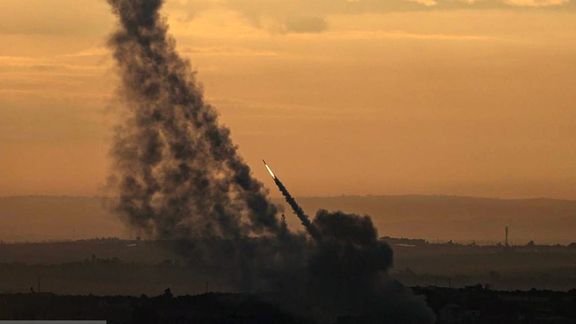
Expressing a balanced view on the Israeli-Palestinian conflict in Iran is risky, as all media are meant to echo the official stance of the Supreme Leader.
However, several social media users noted on Tuesday that even Ali Khamenei sometimes has to retract what he had said earlier without apologizing to anyone or at least make it known that he has changed his view or pretends to have changed it.
On Tuesday, when Khamenei changed his view about Iran's involvement in Hamas terror attack, several social media users compared his previous comment. Earlier, Khamenei had said, "We intervened due to our enmity with Israel and the result was the victory in the 33-day and 22-day wars. We will help any group that would fight Israel." But his opinion was different on Tuesday after being cautioned and warned by US officials: "Islamic Iran is being named as the country behind this move [by Hamas]. But they make a mistake. This was done by Palestinians themselves."
Others in Iran, particularly journalists or media commentators, do not have the luxury of changing their minds voluntarily or otherwise. If the support Hamas in the current war, they are on the safe side. Reminding that Israelis are also entitled to be safe from terrorist attacks is not an option. Judging views from Iran on this matter need to take this reality into account.
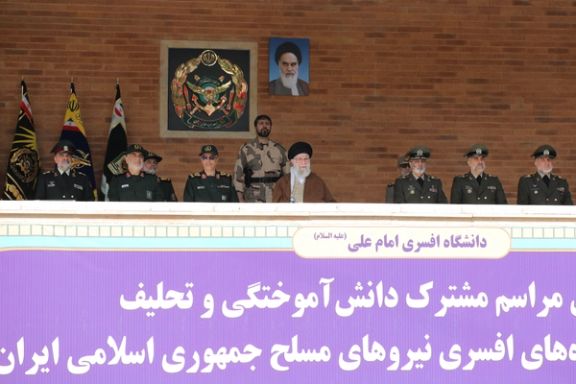
In one of such views expressed by former diplomat Jalal Sadatian, he told Roiuydad24 website: "Israel has done something in Gaza that put an end to Palestinians' tolerance. It was Netanyahu's policies that turned Hamas' defensive policies to aggressive action." This view obviously ignores the fact that Hamas has a military wing with an offensive agenda.
Like all Iranian commentators, Sadatian reverted to the history of the conflict between Israel and Palestinians and the violence by a Lebanese group in Sabra and Shatila in 1982 during the Lebanese civil war charging that the group was an ally of Israel. Meanwhile he blamed Israeli Prime Minister Benjamin Netanyahu for all recent violence against Palestinians ignoring that the attack on Saturday was a surprise operation by Hamas.
The most significant part of Sadatian's analysis is that "Hamas has had no aggressive approach during the past few days." This comes while Hamas slaughtered at least 250 men and women at a music festival as the starting point of its attack on Israel on October 7.
Meanwhile, in an analysis in the reformist daily Shargh, Hassan Lasjerdi commented, “Israel is likely to start a major operation to make up for its biggest intelligence and security defeat as a result of the great operation launched by resistance forces." There is an outright bias in the terms "great operation" and "big defeat."
Lasjerdi further characterized Israel's situation as a "military fiasco" and praised the Hamas operation as "the great Al-Aqsa Storm." Like most Iranian analysts, Lasjerdi could not care less for "impartiality" as an essential characteristic of any reporting.
Meanwhile he opined that there are three scenarios ahead for Israel: A limited attack on Gaza and Palestinian territories, attacking the “resistance” bases in regional countries, and getting several countries involved in a larger scale war in the Middle East.
He further opined that the third scenario is not feasible in terms of Israel's political and military capabilities and its economic potentials. He also ruled out the second scenario by saying that Israel cannot fight the “resistance forces” in Palestine as well as the armies of Syria and Hezbollah in Lebanon. However, Israel is currently fighting Hamas and Hezbollah at the same time, while Syria and Iran are too intimidated to get directly involved in the conflict.
Another analyst, Kourosh Aliani, who is known for his anti-Israeli views, praised Hams' operation as a "unique strategic offensive". Aliani claimed that Hamas has used infiltrators in the Israeli army to collect intelligence for a whole year before the operation.
This is an example of a series of Iranian analyses by individuals who claim to have access to insiders, but their claims are hard to substantiate, but easy to dismiss.
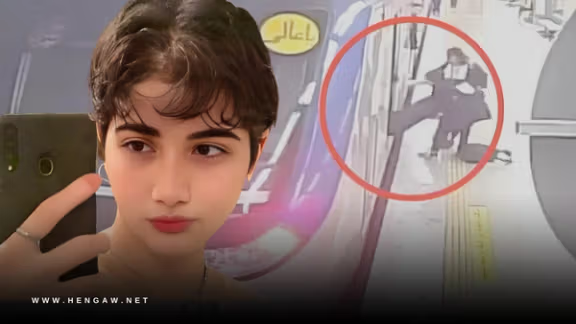
The government-linked Borna news agency reported Wednesday that Armita Geravand’s health has “somewhat” deteriorated.
"Armita Geravand's vital signs, which were relatively stable, have changed over the past few days and have somewhat worsened," reported the news agency linked with the Islamic Republic's Ministry of Sports, without providing further details. It stated that the medical team is still working to improve her condition.
The teenager allegedly fell into a coma after being assaulted by hijab enforcers on her way to school at Tehran subway ten days ago. Authorities have significantly restricted the family's access to Armita at Fajr military hospital in Tehran.
Armita’s serious head injury, which authorities claim she sustained when she fainted on a subway car, serves as a stark reminder to many Iranians of the death of Mahsa Amini in September last year. Mahsa's death ignited months of protests and unrest across the country, and the government is still refusing to accept responsibility for it.
Armita’s mother was briefly detained by security authorities last week ago after protesting their refusal to allow her to see her daughter. Armita’s father was only permitted to see her after agreeing to a televised interview in which he endorsed the official account of the incident, which excludes the role of hijab enforcers.
Independent media outlets have been denied access to the hospital, and they are not allowed to speak with the family. Maryam Lotfi, a reporter who tried to interview Armita’s mother on the day of her hospital admission, was briefly detained. She has refrained from making any comments about her arrest or the incident since then.
The news of another young girl's life-threatening injury, along with televised interviews with her parents and classmates, which many believe were "forced," has outraged many Iranians who are being kept in the dark about her circumstances.
"The Islamic Republic has no legitimacy in the eyes of the people who are certain that the regime is lying about Armita Geravand, as it has always done. The regime has been using forced interviews with Armita's family and friends in an attempt to convince the public that the incident was only an accident," a representative of the United Youth of Iran (UYI) told Iran International.
Iranian social media users have extensively alleged in the past ten days that authorities are deliberately withholding all information about Armita and making every effort to silence her family, with the hope that her case will eventually fall into oblivion amidst the news of the war in Gaza and Israel.
Footage of Armita's presence at the subway station and an audio file of the call made by an employee of the Tehran Metro to the emergency services, which state media have released, have not been able to convince the public that hijab enforcers were not involved in the incident.
Serious suspicions that the footage and audio file were doctored by the authorities to conceal the truth were raised in a long tweet on October 9 by an anonymous user who posts as Avand Fardi.
Fardi, who claims to have meticulously examined and analyzed the video footage and audio file, concluded that either three black-veiled women, who were hijab enforcers on the platform, or a fourth person in the car must have been responsible for assaulting Armita. However, he believes the audio and visual evidence was doctored to conceal this fact.
Furthermore, he has highlighted a discrepancy in the audio file concerning the explanations provided by the metro staff regarding the circumstances leading to the young girl's injury, presumably inside the car where the authorities claim there was no CCTV.
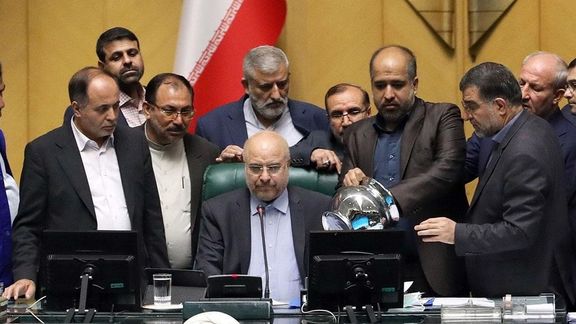
The ultraconservative Paydari (Steadfastness) party of Iran has hailed the terror attack on Israel as "a triumphant operation by the Palestinians."
The party first emerged in Iran during the presidency of populist Mahmoud Ahmadinejad (2005-2013) but has continued to exert its influence on the political landscape throughout the tenures of Presidents Hassan Rouhani (2013-2021) and Ebrahim Raisi (2021 onward).
While the party's leadership remains somewhat opaque, its influence extends over both the parliament and in the presidential administration. Paydari frequently faces criticism for its role in many of the country's political, economic, and socio-cultural challenges, including hijab enforcement.
"The promised day and the eventual displacement of Israelis, along with the celebration of victory in Jerusalem, draw near," read Paydari's statement issued on Wednesday.
A significant number of cabinet members in President Raisi's administration, particularly within his economic team, are reportedly prominent figures in the Paydari party. Its association with Raisi became evident during his presidential election campaign, where key members such as former nuclear negotiator Saeed Jalili played active roles. However, as is common in Iranian politics, it remains challenging to discern who is driving the agenda and who is following it.
On Wednesday, the Israeli death toll from Saturday's attack by Hamas exceeded 1,200. Meanwhile, desperation engulfed Gaza, where the aftermath of Tel Aviv's response to the brutal Hamas attack has left neighborhoods in ruins, homes without electricity, and hospitals running critically low on medical supplies.
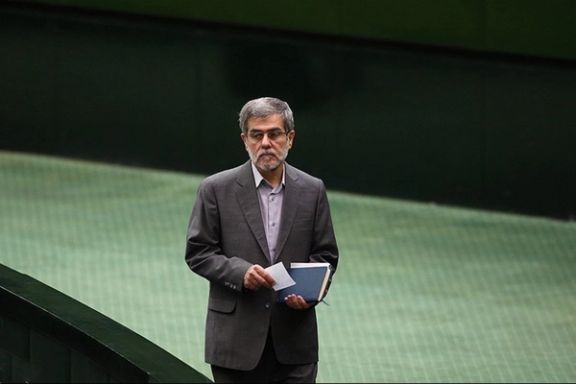
While the international community condemns Hamas' attack on Israel, a hardliner Iranian parliament member argues that weakening Israel will enhance Iran's security.
Fereydoun Abbasi, in a statement to local media on Wednesday, asserted, "The current moment demands a devastating blow against Israel, and we require an even stronger strike; this is currently a prelude to a final strike."
Abbasi is the former head of Iran's Atomic Energy Organization.
He further suggested that Israel's involvement in its own issues will reduce hostile actions within Iran, adding, "If we look at our region, we can observe that all the disruptions are rooted in the policies of the Zionist regime, which sometimes benefits from American support, and these actions' adverse effects will undoubtedly affect other regional countries."
In the official Iranian regime terminology, Israel is referred to as "the Zionist entity" or the "Zionist regime."
Meanwhile, 97-year-old cleric Ahmad Jannati, the Secretary of the Guardian Council, characterized Hamas assault on Israel as a "victorious and promising operation," and said, "The operation has demonstrated that Israel is on a path to destruction, and any government aligning with it will become complicit in its demise."
Such remarks come as the death toll in the Israel-Hamas conflict continued to rise on the fifth day since the Palestinian militant group launched a large-scale. The brutal assault has resulted in over 1,200 deaths in Israel, among them at least 22 Americans. Israeli Prime Minister Benjamin Netanyahu has declared, "We are in a state of war."
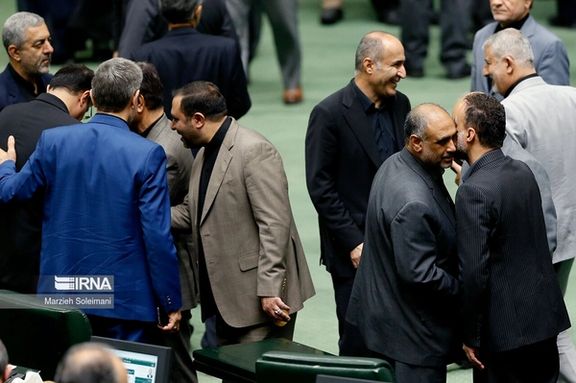
A delegation of Iranian lawmakers is set to travel to Syria and Lebanon to meet with Palestinian militants.
The head of the National Security Committee of the Iranian Parliament announced on Wednesday that they held a meeting with representatives of the Islamic Jihad, Hamas, and relevant organizations to evaluate the developments in Gaza and Palestine.
According to Vahid Jalalzadeh, they also discussed “future operations.”
"We have informed the authorities that the parliament is ready to provide any support in this regard. The Islamic Republic undoubtedly has its own policies, and parliamentarians are at the forefront of the struggle against the Zionist regime and will not hesitate to offer their support," he added.
In the official terminology employed by the Iranian government, Israel is referred to as "the Zionist entity" or the "Zionist regime." Over the course of its 44-year history, Iran's clerical leaders have consistently advocated for the "elimination" or "destruction of Israel."
In 2015, Iran's ruler Ali Khamenei declared that Israel would no longer exist within the next 25 years. Subsequently, in 2016, the Iranian government installed a countdown clock in Tehran's Palestine Square, symbolically marking the time remaining. This followed the signing of a nuclear agreement between Iran and global powers in July 2015.
The comments by Jalalzadeh came amid growing suspicions regarding Iran's involvement in a surprise attack by Hamas on Israel on a Saturday morning. Since the start of the conflict, it has resulted in more than 1,200 Israeli casualties, with over 2,000 individuals sustaining severe injuries and dozens being taken hostage in Gaza.